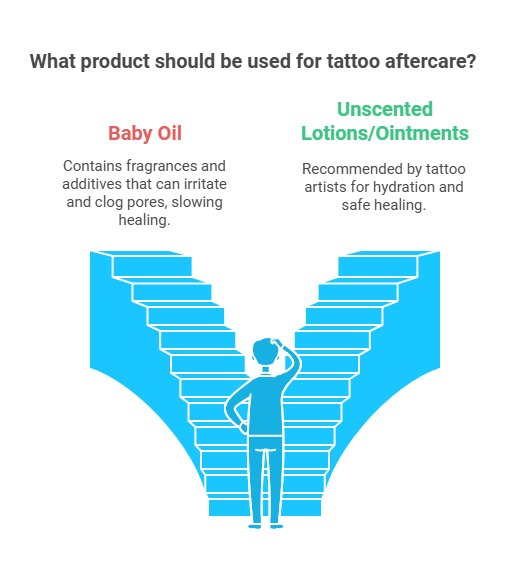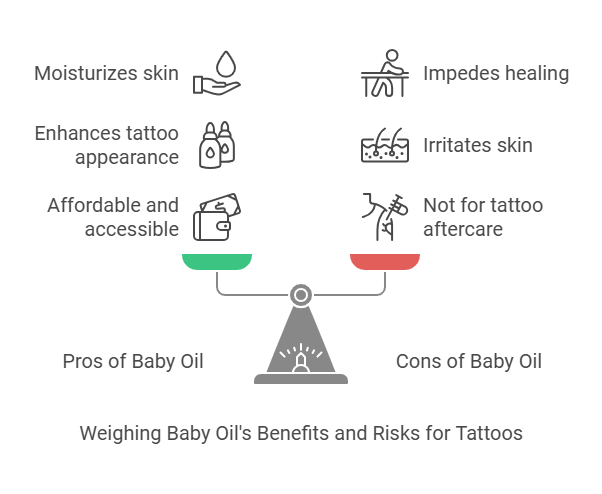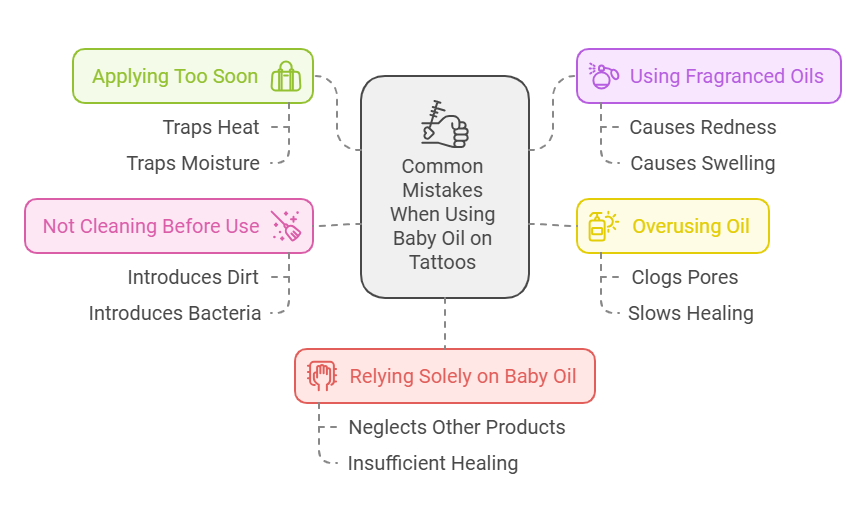As an Amazon Associate. I earn from qualifying purchases
Baby oil is often used for many everyday tasks. It helps moisturize dry skin and remove makeup. But is it safe for fresh tattoos? Some debate surrounds this topic.
Taking care of your tattoo is really important. It keeps infections away and helps it heal properly. Just be sure to use products that work well with your skin and the tattoo. Many people wonder, ‘Is baby oil good for tattoos?’ While it may seem like a quick fix, using it incorrectly can lead to complications.
Let’s uncover the facts about baby oil in tattoo aftercare.
Myth or Miracle? Debunking Baby Oil For Your Ink
The Origins of Using Baby Oil on Tattoos
People have used baby oil for tattoo aftercare for decades. Many think it keeps tattoos hydrated and prevents scarring or peeling. But there is little scientific proof to support this idea. In fact, baby oil might harm a fresh tattoo rather than help it.
Is Baby Oil Good for Tattoos?
Baby oil might seem like a cheap and easy tattoo aftercare option. But it comes with risks. It isn’t made for tattoos and contains fragrances and additives. These can irritate sensitive tattooed skin. They may also clog pores and slow healing. Baby oil also fails to keep tattoos moisturized for long periods.
Tattoo artists suggest using unscented lotions or ointments. These keep the tattoo hydrated and safe from irritation. Products made for tattoos help it heal faster and safely.

Understanding Baby Oil’s Properties
Baby oil is made of mineral oil, vegetable oils, and fragrances. It forms a skin barrier, which has good and bad effects. It can block dirt and bacteria from reaching the tattoo. But it also stops the skin from breathing and healing properly. Baby oil lacks vitamins or nutrients needed for healing. This can cause dryness and scabbing on fresh tattoos.
Keeping dirt away sounds helpful, but tattoos need air to heal. Air helps them heal faster and lowers the risk of infection. Baby oil, by blocking airflow, hinders this vital step.
The Cons of Oiling Your Fresh Tattoo
Impeding the Healing Process
Tattoos need air to heal properly in the early stages. Baby oil’s barrier can trap heat and moisture. This traps bacteria, which can harm a new tattoo.
A tattoo needs air to prevent bacteria from growing. Too much moisture can cause infection and harm the design.
Risk of Allergic Reactions
Fragrances in baby oil can cause allergies like redness, swelling, or itching. Itchy tattoos heal slower and may get damaged.
Always test products on a small patch of skin before applying them to your tattoo. It’s best to avoid any products with fragrances or additives, especially during the healing period.

The Bright Side of Baby Oil After Tattoos Are Settled
Daily Post-Healing Care
After the initial healing stage, baby oil can be useful for daily care.It’s an easy way to keep your skin and tattoo moisturized. It can make the tattoo colors look brighter and last longer.
Enhancing the Look and Longevity
Using a little baby oil on an old tattoo can really help. It keeps the skin soft and makes the colors pop. Plus, it helps the skin stay stretchy, so it won’t wrinkle or sag as much over time.
In Short Pros & Cons
Pros
- Affordable and easily accessible
- Can enhance the look of an older tattoo
- Can moisturize and soften the skin around a healed tattoo
- Can make colors appear more vibrant
Cons
- Not specifically formulated for tattoo aftercare
- Contains fragrances and additives that can irritate or clog pores
- Can impede the healing process by trapping heat and moisture
- Does not provide essential nutrients for proper healing
Common Mistakes People Make When Using Baby Oil on Tattoos
Using baby oil on tattoos might seem easy, but there are common mistakes to avoid. These errors can affect healing and the tattoo’s appearance.
Applying Baby Oil Too Soon
A common mistake is applying baby oil too early. Fresh tattoos need air to heal. Baby oil can trap heat and moisture, leading to infections or scabbing.
Using Baby Oil with Fragrances
Many baby oils have fragrances or chemicals that can irritate tattooed skin. These can cause redness, swelling, or itching. Use fragrance-free oils or avoid baby oil while healing.
Overusing Baby Oil
Overapplying baby oil is another mistake. A small amount is enough. Using too much can clog pores and cause breakouts or irritation. It can also slow healing by making the skin greasy.
Not Cleaning the Tattoo Before Application
Always clean your tattoo before applying any aftercare products. Not doing so can introduce dirt or bacteria, leading to infections. Make sure your tattoo is clean and dry before using baby oil.
Relying Solely on Baby Oil
Some people rely only on baby oil for tattoo care, neglecting other products. Baby oil isn’t enough during the healing stage. Use a good tattoo-specific lotion or ointment for better results.
Avoid these mistakes to help your tattoo heal well and stay bright for years.

Conclusion
Is baby oil good for tattoos? The answer isn’t simple. Baby oil can both help and harm your tattoo. When used carefully, it can moisturize, showcase, and protect your ink. But during the healing stage, it might do more harm than good. The best approach is to use water-based lotion, stay cautious, and consult your tattoo artist. A beautiful tattoo deserves careful care.

